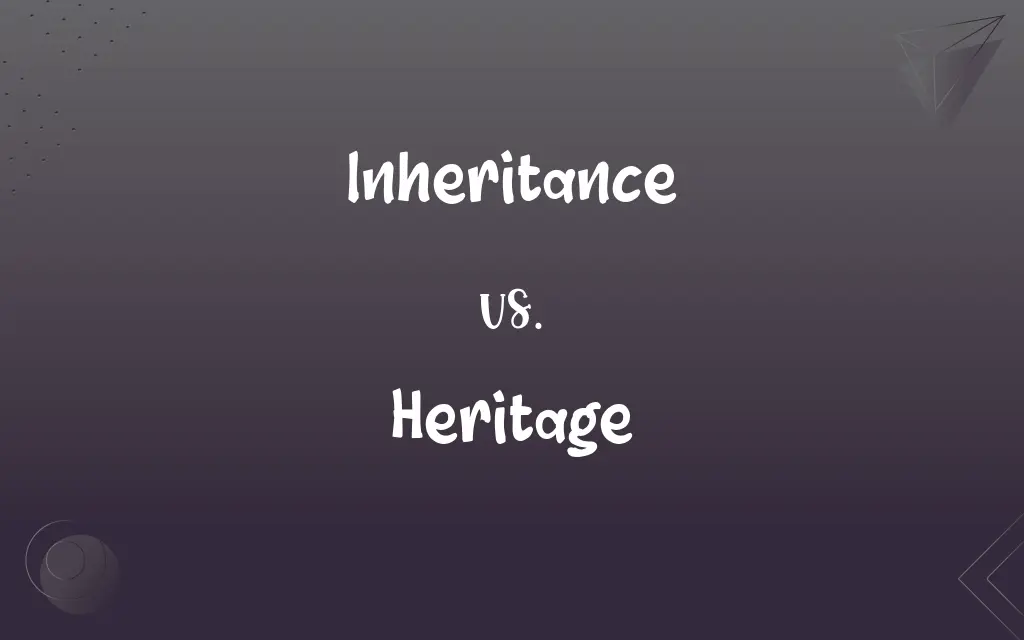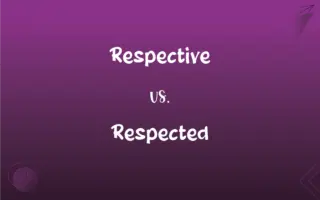Inheritance vs. Heritage: What's the Difference?
Edited by Harlon Moss || By Janet White || Updated on October 3, 2023
Inheritance refers to assets or characteristics passed down from previous generations, while heritage encompasses cultural and historical traditions or practices of a group or nation.

Key Differences
Inheritance and Heritage, though both indicating something passed down, pertain to different aspects of lineage and legacy. Inheritance primarily denotes assets, properties, or even genetic traits handed down from one generation to another. It's a tangible or intangible possession or right passed from a predecessor. Conversely, Heritage leans more towards the cultural, historical, or traditional practices, beliefs, or values shared by a group or community.
Both Inheritance and Heritage play significant roles in shaping an individual's identity. While an inheritance might grant a person financial security or traits from ancestors, heritage molds an individual's cultural identity, offering a sense of belonging. Heritage acts as an anchor to historical roots, reminding people of their origins, while inheritance often has legal connotations, often requiring documentation or processes for transfer.
Delving deeper, inheritance can be both material, like estates, jewelry, or money, and immaterial, such as talents or genetic predispositions. On the other hand, heritage encompasses shared experiences like language, festivals, folklore, and even culinary traditions, passed down through generations, creating a collective memory.
Summing up, while inheritance is more about personal or familial assets and traits, heritage broadens the scope to cultural, historical, and traditional aspects, often shared by larger groups, communities, or even entire nations.
Comparison Chart
Nature
Often tangible assets or traits.
Intangible traditions, practices, or values.
ADVERTISEMENT
Scope
Individual or familial.
Group, community, or nation.
Examples
Property, money, genetic traits.
Language, festivals, folklore.
Transfer
Legal processes, documentation.
Through teaching, practice, or shared experience.
Relation
Direct, from predecessors to successors.
Broad, passed down through generations or cultural groups.
Inheritance and Heritage Definitions
Inheritance
Assets passed down after someone's death.
She received a house as part of her inheritance.
ADVERTISEMENT
Heritage
Traditions or practices passed through generations.
They take pride in their indigenous heritage.
Inheritance
Wealth or properties bequeathed to heirs.
Their family's vast inheritance came from old oil businesses.
Heritage
Historical or cultural values of a community.
The museum houses artifacts showcasing the nation's heritage.
Inheritance
A familial possession or entitlement.
The antique clock has been an inheritance for generations.
Heritage
Legacy or shared experiences of a group.
Speaking the native language connects them to their heritage.
Inheritance
Genetic traits acquired from parents.
His blue eyes are an inheritance from his mother.
Heritage
The festival is a significant part of our cultural heritage.
Collective identity formed by shared history.
Inheritance
The action of inheriting something
The inheritance of property from a relative.
Heritage
Property that is or can be inherited; an inheritance.
Inheritance
Something inherited or to be inherited
Her inheritance included a large estate.
Heritage
Something that is passed down from preceding generations; a tradition.
Inheritance
Something regarded as a heritage
The cultural inheritance of Rome.
Heritage
The status acquired by a person through birth; a birthright
A heritage of affluence and social position.
Inheritance
The process of genetic transmission of characteristics from parent or ancestor to offspring.
Heritage
A domesticated animal or a crop of a traditional breed, usually not widely produced for commercial purposes.
Inheritance
A characteristic so inherited.
Heritage
An inheritance; property that may be inherited.
Inheritance
The sum of genetically transmitted characteristics.
Heritage
A tradition; a practice or set of values that is passed down from preceding generations through families or through institutional memory.
Inheritance
The passing of title to an estate upon death.
Heritage
A birthright; the status acquired by birth, especially of but not exclusive to the firstborn.
Inheritance
(countable) That which a person is entitled to inherit, by law or testament.
Heritage
(attributive) Having a certain background, such as growing up with a second language.
A heritage speaker; a heritage language
The university requires heritage Spanish students to enroll in a specially designed Spanish program not available to non-heritage students.
Inheritance
The act or mechanism of inheriting; the state of having inherited
The Indo-European languages share various similarities as a result of their inheritance from a common ancestor.
Heritage
That which is inherited, or passes from heir to heir; inheritance.
Part of my heritage,Which my dead father did bequeath to me.
Inheritance
The biological attributes passed hereditarily from ancestors to their offspring.
Heritage
A possession; the Israelites, as God's chosen people; also, a flock under pastoral charge.
Inheritance
The mechanism whereby parts of a superclass are available to instances of its subclass.
Heritage
Practices that are handed down from the past by tradition;
A heritage of freedom
Inheritance
The act or state of inheriting; as, the inheritance of an estate; the inheritance of mental or physical qualities.
Heritage
Any attribute or immaterial possession that is inherited from ancestors;
My only inheritance was my mother's blessing
The world's heritage of knowledge
Inheritance
That which is or may be inherited; that which is derived by an heir from an ancestor or other person; a heritage; a possession which passes by descent.
When the man dies, let the inheritanceDescend unto the daughter.
Heritage
That which is inherited; a title or property or estate that passes by law to the heir on the death of the owner
Inheritance
A permanent or valuable possession or blessing, esp. one received by gift or without purchase; a benefaction.
To an inheritance incorruptible, and undefiled, and that fadeth not away.
Heritage
Hereditary succession to a title or an office or property
Inheritance
Possession; ownership; acquisition.
To you th' inheritance belongs by rightOf brother's praise; to you eke 'longs his love.
Heritage
The ancient ruins are a testament to the city's rich heritage.
Physical artifacts representing a community's past.
Inheritance
Transmission and reception by animal or plant generation.
Inheritance
A perpetual or continuing right which a man and his heirs have to an estate; an estate which a man has by descent as heir to another, or which he may transmit to another as his heir; an estate derived from an ancestor to an heir in course of law.
Men are not proprietors of what they have, merely for themselves; their children have a title to part of it which comes to be wholly theirs when death has put an end to their parents' use of it; and this we call inheritance.
Inheritance
Hereditary succession to a title or an office or property
Inheritance
That which is inherited; a title or property or estate that passes by law to the heir on the death of the owner
Inheritance
(genetics) attributes acquired via biological heredity from the parents
Inheritance
Any attribute or immaterial possession that is inherited from ancestors;
My only inheritance was my mother's blessing
The world's heritage of knowledge
Inheritance
A legacy or right passed from predecessor.
The throne was his by inheritance.
FAQs
How is "Heritage" defined?
"Heritage" relates to traditions, values, and cultural legacy passed down through generations.
Can "Inheritance" be both tangible and intangible?
Yes, one can inherit physical assets like property, as well as intangible ones like genes or skills.
What does "Inheritance" primarily refer to?
"Inheritance" usually refers to assets or traits passed down from previous generations.
Is "Heritage" specific to a particular region or culture?
While "Heritage" can be tied to specific regions or cultures, it's a universal concept present in all societies.
Can "Inheritance" be taxed?
Yes, many countries have an inheritance or estate tax on assets passed down.
What is the connection between "Inheritance" and genetics?
In genetics, "Inheritance" refers to the genes and traits passed from parents to offspring.
Is "Inheritance" limited to family relations?
Typically, inheritance is family-centered, but it can also involve non-relatives if specified in a will.
How is "Inheritance" typically legally transferred?
"Inheritance" is often transferred through wills or, in their absence, by legal norms of succession.
Can a language be considered "Heritage"?
Absolutely, languages are vital parts of cultural heritage and identity.
Are world heritage sites connected to the term "Heritage"?
Yes, world heritage sites are landmarks recognized for their cultural, historical, or scientific significance to humanity's heritage.
Can a person decline an "Inheritance"?
Yes, inheritances can be declined or disclaimed based on individual choices or legal reasons.
How does UNESCO contribute to "Heritage"?
UNESCO identifies and helps protect world heritage sites of cultural or natural significance.
Can "Inheritance" be equally distributed?
Yes, many choose to divide their assets equally among heirs, but it's subjective to individual wishes.
How is "Heritage" preserved?
Heritage can be preserved through documentation, education, laws, conservation efforts, and cultural celebrations.
Is everyone guaranteed an "Inheritance"?
No, inheritance depends on the assets of predecessors and their decisions on distribution.
Is "Heritage" only about the past?
No, while heritage draws from the past, it influences the present and is continuously shaped by current generations.
Can "Heritage" be commercialized?
While heritage is a source of pride, it can also be commercialized, especially in tourism and media.
Can "Heritage" change over time?
While core elements of heritage might remain, interpretations and expressions of heritage can evolve over time.
Can a dance form be part of "Heritage"?
Absolutely, dance forms can be integral to cultural heritage and expressions of identity.
Can "Inheritance" lead to legal disputes?
Yes, inheritance can sometimes lead to disputes among heirs or claimants.
About Author
Written by
Janet WhiteJanet White has been an esteemed writer and blogger for Difference Wiki. Holding a Master's degree in Science and Medical Journalism from the prestigious Boston University, she has consistently demonstrated her expertise and passion for her field. When she's not immersed in her work, Janet relishes her time exercising, delving into a good book, and cherishing moments with friends and family.
Edited by
Harlon MossHarlon is a seasoned quality moderator and accomplished content writer for Difference Wiki. An alumnus of the prestigious University of California, he earned his degree in Computer Science. Leveraging his academic background, Harlon brings a meticulous and informed perspective to his work, ensuring content accuracy and excellence.































































